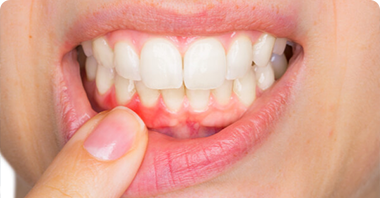

Bleeding gums are inflamed or irritated pink tissue around the mouth which bleed easily. Bleeding gums is a common problem of oral health. If your gums bleed while brushing or flossing, you might shrug it off thinking it is normal, but bleeding from the gums could at times signal an underlying problem. Signs and symptoms of bleeding gums 1. Red coloured stain on your toothbrush after brushing. Causes of Bleeding Gums 1. Brushing too vigorously Treatment for Bleeding Gums - How to stop bleeding gums? The main reason for bleeding gums is inadequate oral health care - Hence, oral care has to be given priority. There are ways which will help one to improve oral health care and get rid of bleeding gums. 1. Brushing regularly and Flossing Daily Make sure you are using a soft bristle toothbrush. Brushing twice a day for at least 2 minutes, this will help stimulate your gums, strengthen the tissues and prevent bleeding gums. Flossing helps in removing plaque and food particles stuck along the gum line which could otherwise lead to bleeding gums. Improving the method of flossing and changing the toothbrush every 2 months will contribute to keeping gums healthy. 2. Quit smoking In addition to heightening the risk of lung cancer, heart disease, and stroke, smoking is also linked to gum disease. Smoking is a major cause of severe gum disease and can lower your body’s immune system, making it harder for your body to fight off plaque bacteria. 3. Visit the Dentist Regularly Regular cleaning at a dental clinic is very essential. The cleaning involves the removal of tartar and other plaques. Professional cleaning by a dentist at least twice a year prevents gum disease. 4. Maintaining a Balanced Lifestyle Eating a proper and balanced diet is very important - avoid eating between meals. Eat food rich in vitamin C and K like oranges, carrots, spinach, etc. Reducing anxiety and stress can also help in preventing bleeding gums. How? There is a link between periodontal disease and emotional stress. Emotional stress has a negative impact on the immune system. This may result in weakening of the body’s defenses to the point where it can’t fight a gum infection. 5. Use of medications Use antibiotics pills or antiseptic mouthwash to maintain your oral hygiene. In case the gums have become little inflamed but are not bleeding antibacterial mouthwash, toothpaste or oral gel can help you fight onset of the infection and prevent bleeding gums. 6. Rinse your mouth with salt water Regularly rinsing the mouth with a mixture of warm salt water reduces bacteria and stops gum bleeding. If bleeding is from an injury or trauma, rinsing with a salt water mixture also keeps your mouth clean and removes bacteria that could cause a wound infection.
2. Slight blood when chewing gums
3. Blood visible on teeth or lips.
4. When you spit out saliva blood traces can be seen.
5. Mouth Sores
6. Lump on gums
7. Loose teeth or teeth appear longer.
8. Receding gums
9. Excessive pain while chewing food or after eating crunchy foods.
2. Using a toothbrush with hard bristles.
3. Dentures or retainers which are not fitted properly.
4. Bacterial infection in the tooth or gums.
5. Hereditary.
6. Use of blood thinning medicines
7. Gum bleeding is also caused due to poor lifestyle such as poor eating habits. Consuming a lot of sugary foods and not maintaining proper dental hygiene as this makes way for the bacteria to grow and causes swollen gums.
8. Smoking irritates gums and leads to bleeding gums.
9. Sometimes pregnancy could also be the cause of bleeding gums
At Dental solutions Bangalore clinic, we examine and check if the bleeding is due to some simple irritation or if the problem is serious. Our dental clinic has been been recommended by patients for best dental treatments. For more information, please navigate through the services section of the website.